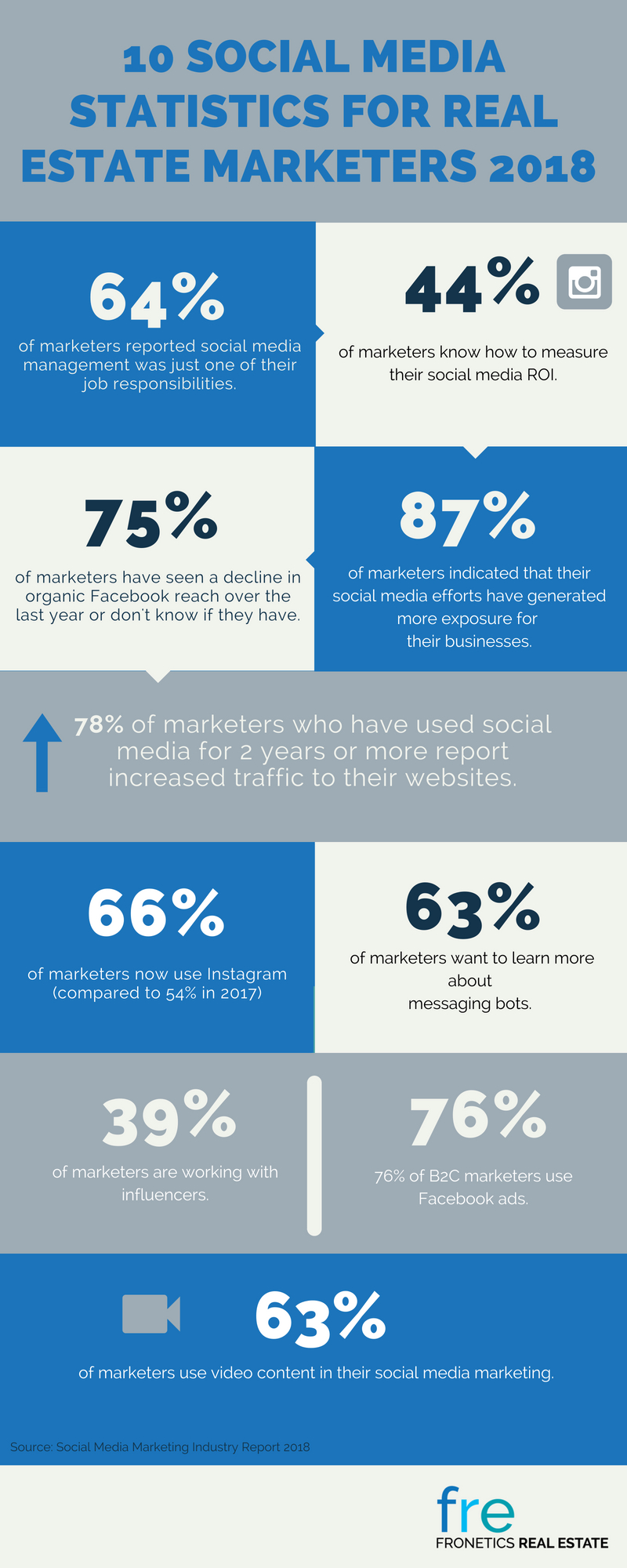Your search results for "Measuring success"

Top 10 Real Estate Marketing Posts 2017
Here are Fronetics Real Estate’s most-viewed real estate marketing posts from the last year.
2017 was an exciting year for Fronetics Real Estate. We officially launched our brand, and website, in September. But despite our relatively recent kickoff, FRE is an entity born out of a longstanding expertise in real estate marketing. We have been working with residential and commercial real estate clients for many years under our parent brand, Fronetics.
It is that expertise that we aim to provide for the readers of the Fronetics Real Estate blog. This year, the following have been our most-viewed posts.
Top 10 real estate marketing posts
1) Using Content Marketing to Market and Sell Luxury Real Estate
In real estate sales, you want people to find your properties, like what they see, and ultimately be moved to purchase. In other words, you want to attract visitors, convert visitors to leads, and convert leads to deals. Innovative luxury real estate firms are finding ways to leverage digital tools to guide more buyers down that path to purchase. Read more
2) This Is How Often Real Estate Companies Should Post on Social Media
With social media networks changing daily, it’s hard to keep up with where to distribute content, much less how often. Countless studies have attempted to solve the social-media-frequency equation. And while audiences vary across price points and regions, best practices give us some general guidelines. Here’s our assessment of social media posting frequency. Read more
3) The Metrics You Should Be Measuring in Real Estate Marketing (Hint: Not Vanity Metrics)
Whether renting a new property or launching a social media campaign, we look for instantaneous numbers that will affirm we made the right choices. But here’s the problem: not all metrics are created equal. So-called vanity metrics are measurements that have no bearing on your bottom line but can give you an inflated sense of success. Read more
4) Learn How Content Marketing Increased Real Estate Sales by 37% in 90 Days
Consider this case study of a leading real estate marketing firm who chose to use digital and content marketing to shake up their traditional marketing approach. After just three months of beginning a digital and content marketing program, the firm recognized significant gains in web traffic, social media engagement, and brand exposure. Read more
5) This Is the First Thing You Should Do in Real Estate Marketing
Content marketing is one of the most effective ways to elevate your property’s reputation in the market, reach prospective buyers or tenants, and increase occupancy. Yet while many real estate marketers are using content marketing, not all feel their efforts are successful. Why do so many organizations feel they are failing? Simply put, they do not have a documented strategy in place. Read more
6) Real Estate Firm Grows Sales by 300% through Content Marketing
this case study about a prominent real estate marketing firm in one of the most competitive markets in the U.S. When traditional tactics weren’t bringing in the kind of business needed to sell 1,500 new-construction homes in a new planned community, the firm turned to a new content marketing program to increase web traffic and build brand awareness. Read more
7) Social Media Can Be a Strategic Weapon in Real Estate Marketing
The real estate industry is built on relationships, partnerships, cooperation, networks, and communication. Being social is a key part of forging a successful real estate marketing strategy. It’s time for the industry to embrace the tools that social media platforms offer. Read more
8) Paid Digital Advertising: A Beginner’s Guide for Real Estate Marketers
By investing in paid digital advertising, you can boost the reach of your posts, display ads, and videos. Pair quality content with a comprehensive digital advertising strategy, and you will be in a position to drive more traffic, create more brand visibility, and sell or lease more properties. Read more
9) 6 Signs It’s Time to Consider Outsourcing Your Real Estate Marketing
Real estate companies are increasingly open to outsourcing real estate management because it allows them to focus on their core competencies while improving effectiveness. So why not apply the same rationale to bolster your marketing efforts? Don’t be afraid to look outside the box for the marketing tools you need to succeed. Read more
10) 5 Tips for Building a Successful Real Estate Social Media Marketing Program
Social media is an excellent tool for real estate marketers to communicate with residents/tenants, build brand awareness, gain market intelligence, and even identify prospective tenants or buyers. Particularly if the latter is your focus, it’s easy to celebrate every follower you earn as a marketing success. But it’s important to remember that a social media follower doesn’t necessarily equal a buyer/tenant. After all, participating in social media is not only about earning a large following; it’s about building relationships with those people. Read more
Runner-up posts:
- 4 Tools for Determining the Best Time to Post on Social Media for Your Property
- Start Your Property’s Social Media Program in Six Steps
- These are the Busiest Day of the Year for Real Estate Searches
Your search results for "Measuring success"

10 Social Media Statistics for Real Estate Marketers 2018
The latest social media statistics show growth of Instagram, social messaging bots, and video content.
We joke around here that one thing that will always stay the same is that social media will always be changing. 2018 has been a remarkable example of that thus far, particularly in regards to platforms like Facebook.
Every so often, we like to take a step back and look at what the data is telling us about where social media is heading and what that might mean for real estate marketers.
Social Media Examiner’s 10th annual study, 2018 Social Media Marketing Industry Report, surveyed more than 5,700 marketers from across the world in a variety of industries — including real estate. It offers a really comprehensive view of what’s going on in social media in our industry and beyond.
I’ve pulled out 10 social media statistics from this report that I want to talk about in more depth. I think they say a lot about where social media is headed and what real estate marketers should be paying attention to.
10 social media statistics for real estate marketers
1) For 64% of marketers, social media management is just one of their job responsibilities.
This one blows me away, knowing how much time and effort it takes to run a company’s social media program. Only about one-third (36%) of marketers manage social media full time. The other two-thirds have to do that on top of their other responsibilities. That’s crazy!
Developers, property managers, and real estate marketers: it’s time to recognize how important social media is for marketing your property and dedicate the appropriate resources to social media management. If you can’t afford to hire someone to do it full time, consider outsourcing this task.
2) Only 44% of marketers agree they can measure their social media ROI.
Only 10% of survey respondents “strongly agree” and 34% “agree” with the statement, “I am able to measure the return on investment (ROI) for my social media activities.”
Again, I’m kind of blown away. As a firm that relies on data and analytics to inform our processes and strategies, including social, it seems irresponsible to not know if your efforts are effective.
Ok, on one hand, it’s actually really difficult to measure social media ROI. That’s in large part because so many of the benefits are intangible. You should really be thinking of social media investment in terms of potential, not dollars.
BUT there are some ways to calculate ROI for all your content marketing and social media efforts. Here are a few resources:
- What Metrics Should You Track in Real Estate Marketing?
- The Metrics You Should Be Measuring in Real Estate Marketing (Hint: Not Vanity Metrics)
- How to Measure Brand Awareness: A Guide for Real Estate Marketers
3) 75% of marketers have seen a decline in organic Facebook reach over the last year or don’t know if they have.
A significant 52% of marketers surveyed said they saw their Facebook reach decline in the last year. Plus, 23% of marketers surveyed were unsure if it had or not — probably not a good sign. Yet 97% of B2C marketers are using Facebook. Something’s not adding up for me here.
As we’ve written about a lot recently, businesses need to be keeping a close eye on Facebook in light of all the recent changes. While we at Fronetics Real Estate are not ready to write off Facebook for business (especially real estate companies) completely yet, it’s time to start doing things a little differently.
Here are a few things you should do immediately to ensure you’re still reaching your target audience:
- Focus on newsworthy content that drives engagement. You need to start thinking of Facebook as a place to post and discuss active news items, hot-button issues, and highly shareable content (content that is educational or entertaining, for example).
- Tell your community to access the See First feature. Users who still want to see posts from certain Pages they follow can choose “See First” in News Feed Preferences. So, quite simply, we suggest asking your followers to choose to see your content.
- Consider your ad budget. Especially for new properties or those who rely heavily on referral traffic, you might want to consider reallocating budget to sponsored ads.
Stay tuned to the Fronetics blog as we continue to gather information and offer suggestions.
4) 87% of marketers rank more exposure for their businesses as the primary benefit of their social media efforts.
Building brand awareness is a key benefit of social media use for real estate. The Social Media Examiner survey respondents said that increased traffic was the second major benefit, with 78% reporting positive results. These top two benefits have remained virtually unchanged for 4 years.
5) 78% of marketers who have used social media for 2 years or more report increased traffic to their websites.
Also to note, 83% of those who have used social media for 5 or more years “strongly agree” or “agree” that traffic has increased to their websites because of social media activity.
I wanted to pull these social media statistics out because they reinforce the time-honored truth that content marketing (including social media management) is a long-term solution — not an overnight fix. The benefits, especially in terms of metrics like traffic, grow exponentially over time.
You have to allow time for prospects to find you and for your audience to grow organically. Use your social media platforms as a means to distribute meaningful information to your target audience and to communicate with prospects and residents, and it will pay off.
6) 66% of marketers are now using Instagram.
In 2016 and 2017, we answered a lot of questions about Snapchat. Founder of the Content Marketing Institute Joe Pulizzi named Snapchat one of the next big trends in content marketing for 2017. Everyone thought this platform was going to be our new social media darling.
Instead, Instagram has surpassed Twitter and LinkedIn to be the second-most-used social media platform. (It was fourth in 2017.) Use is up dramatically from 54% in 2017. Those are numbers worth paying attention to.
Most of our real estate clients use Instagram with great success. If you’re not on this platform, it’s time to join.
7) 63% of marketers use video content in their social media marketing.
One real estate marketing trend everyone got right? The growing prevalence of video.
Not only do nearly two-thirds of marketers use video content in their social media marketing, 23% use live video. What’s more, 77% plan to increase video content and 63% plan to increase live video in the next year.
The real estate industry is embracing the power of video marketing. And the good news is, you don’t need expensive camera, lighting, or a production studio — your smartphone can be just as effective for creating video content for your social media outlets.
8) 70% of marketers want to learn more about messenger bots.
Here’s a big takeaway from the survey: Everyone’s talking about messenger bots/social messenger apps. While adoption is still pretty low (only 15% are using Facebook messenger bots now), 51% of survey respondents plan to include them in future marketing.
It’s time to start reading up on marketing automation tools like chatbots and social messenger apps. We’ve got a lot of information about these things scheduled on our blog in the next few months, so keep coming back for more information on how these tools apply to real estate marketing.
9) 39% of marketers are working with influencers.
Influencer marketing is another trend we’ve been talking about lately. It makes sense: Buyers value the opinions of peers and colleagues. In fact, 82% of Americans seek recommendations when making a purchase of any kind. Such a major purchase like real estate can be greatly influenced by what buyers’ peers think of the neighborhood, community or building, etc.
In real estate, it’s important to consider other people who might influence buyers and renters. Aside from family and friends, financial advisors, brokers, interior designers, and celebrities (be they local professional athletes or social media celebrities) can have an impact on buyers’ opinions of a property.
10) 76% of B2C marketers use Facebook ads.
Interesting that more than three-fourths of B2C brands advertise on Facebook. On one hand, if you’re not doing it, do you lose your seat at the table? But on the other, are there opportunities on other advertising platforms that aren’t so crowded?
The survey also found that 72% of B2C marketers are interested in learning about Instagram ads. This is likely because of the platform’s phenomenal growth and, no doubt, brands’ success with it thus far. It’s something to think about when planning your social advertising.
If you’re interested, I recommend reading the whole 44-page report from Social Media Examiner. There are a ton of really interesting social media statistics that offer great insight into how marketers are using social media and how it’s changing — both over the the last few years and in the short-term.
What social media statistics are most interesting to you?
Related posts:
- A Visual Guide to Social Media Posting Frequency for Real Estate
- How to Use Social Media Hashtags in Real Estate Marketing
- Social Media Can Be a Strategic Weapon in Real Estate Marketing
Your search results for "Measuring success"
Blog
Real Estate Blog 6 Luxury Real Estate Trends to Keep an Eye On by Katie Russell | Sep 17, 2019 | Blog, Content Marketing, Real Estate Marketing | 0 CommentsFrom security and privacy measures to wellness amenities, here are six luxury real estate trends for marketers...Your search results for "Measuring success"

5 Tips to Make Your Real Estate Website an Effective Selling Tool
Use your real estate website to boost engagement and drive sales. Here are five tips to start using your website as a selling tool in the sales process.
Highlights:
- In order to move visitors down the sales funnel, a brand’s website needs to be informative, visually pleasing, and functional.
- Your brand strategy should drive the layout, design and content to make sure all elements of your website align.
- A testimonial page on your website provides an opportunity for clients to talk about how satisfied they are with your properties, creating customer loyalty and increased brand trust.
Your real estate website can be a powerful tool in driving business growth. After all, it is the public face of your company. But the demands of digital marketing — social media, blog writing, video — can take center stage, leaving your website behind the scenes.
Real estate marketers need to give websites the attention they deserve. After all, most of your digital marketing efforts are driving visitors to your site. What happens once prospects get to your real estate website is key to the buyer’s journey. In order to move visitors down the sales funnel, a brand’s website needs to be informative, visually pleasing, and functional.
Here are 5 updates you should make to your company real estate website to help increase sales.
1. Brand messaging
Your website might be beautiful, but it also needs to be valuable. What makes your property different from other properties? What makes your brand better than the competition? Make sure that your website accurately depicts your brand and what makes it unique. Your brand strategy should drive the layout, design and content to make sure all elements of your website align.
2. Live chat
Did you know that 82% of consumers rate an “immediate” response as important or very important if they have a question? Live chat is one of the easiest ways to communicate with leads, in real time. The way prospects communicate with brands is changing. More and more leads want immediate responses and live chat gives brands an opportunity to deliver on their wants and needs. It’s also an effective way to capture contact information for visitor’s already poking around on your website.
3. Video
The popularity of video sites, like YouTube and Vimeo, is just the starting point for capitalizing on your videos. If you’ve invested in a corporate video or even shot quick interviews in your office, start using them on your website. The brain processes visual information 60,000 times faster than text, so providing videos on your website helps your brand’s messaging resonate longer with visitors. A great example of a real estate brand utilizing video is Ditto. The homepage features a large video that is visually appealing and is a sure way to keep visitors on their site longer.
4. Testimonials
Visitors to your website are learning about your real estate brand through your content (text and visual), but they may still be hesitant to put their trust in your hands. As a marketer, you know that customer testimonials are a great way to increase trust, so why not showcase your satisfied — dare I say — happy clients? A testimonial page on your website provides an opportunity for clients to talk about how satisfied they are with your properties, creating customer loyalty and increased brand trust.
5. Measure
We talk a lot about the importance of a data-driven approach when it comes to measuring success. To grow your business strategically, you need to track your efforts, analyze successes and failures, and determine ROI. This holds true for all aspects of your digital marketing strategy, including your website. Use tools, like Google Analytics, to regularly track traffic and engagement. Determine which pages visitors are converting on and why and make sure to tweak pages that have a high exit rate.
It’s no longer optional for businesses to have a website, it’s essential. Websites are a virtual profile of your brand and when used correctly can encourage action by prospects. Utilizing these tips will help boost engagement and drive sales through your real estate website site.
Related posts:
- 3 Ways to Boost Your Real Estate Marketing with Video
- Video: How Content Marketing for Real Estate Can Help Sell Properties
- 4 Types of Content Real Estate Marketers Need to Be Using
Your search results for "Measuring success"

4 Tools for Determining the Best Time to Post on Social Media for Your Property
Determine when and where your target buyers are online to find the optimal time to post on social media.
Social media has changed the landscape for doing business, particularly when it comes to real estate. With the click of a button, companies are able to instantly communicate with untapped markets and potential buyers and tenants. Face-to-face interactions are often overshadowed by live streaming videos, tweets, chats, and likes. For real estate sales and rentals, the possibilities for social media marketing are virtually endless.
But it’s not enough to curate content for your social media platforms. Today’s social media users expect fresh, innovative ideas around the clock. And when this content is being shared is just as valuable as what is being shared.
There’s a lot of research out there that highlights the optimal time to post on various social media platforms. For example, marketing analytics software provider TrackMaven has published its Best Times to Post on Social Media Cheat Sheet, which breaks down posting by industry, brand, and product. It also offers general dates and times that can boost success.
But the truth is, there is no one-size-fits-all social media posting solution.
You need to take it one step further. You need to know the best time for your unique property to post content. You want more than just a general idea of when to post. You want specific information about your target buyers and tenants — when they’re actively scrolling, reading, watching, and liking your content.
As you get a sense for when your target audience is most likely to interact with your content, be sure to keep in mind the ideal frequency for real estate companies to post to each social media platform.
Determining the best time to post on social media
There’s a broad range of tools available that will analyze the personal data of your social media followers and help you compute the best time to post on social media. Here are four that we think offer the most useful information and are easy to use.
1) Hootsuite
Hootsuite is a social media management tool that can do everything from scheduling social media posts to measuring your social media ROI. The AutoSchedule feature lets Hootsuite determine the best time to publish a post or tweet based on when similar content performed well in the past. It also considers the platform and can publish the same message at different times based on audience engagement on each particular network.
2) Tweriod
Tweriod, a free Twitter tool that helps you know the best time to tweet, is changing the way companies approach their marketing tweets. It will evaluate up to 1,000 of your followers and their tweeting patterns, including schedule, interests, and retweets. You then receive an analysis of when your tweets will receive the most exposure.
3) Google Analytics
Google Analytics is a robust analytical tool for determining how web users are interacting with your digital assets, including social media. Three custom reports (Best Days to Post on Social Media, Best Time to Post on Social Network by Hour, and the Social Media Traffic by Date and Hour) offer real-time, in-depth insight. Best of all, Google Analytics is free!
4) SproutSocial
SproutSocial offers a customized dashboard with a quick overview of how your social media channels are performing. You also can gain deeper insight into your customers — like gender and age demographics, crucial information for real estate marketing. And you can assess your customer reach and what will work in your favor.
Creating a strong social media presence is essential for any property. But having a presence is just a starting point in understanding how to fully optimize these ever-changing platforms to work for you.
Using online tools to analyze when and where your content should be posted will enhance the value of your social media efforts. In short, you have the best chance of generating leads and closing deals by pushing your content through the right avenues at the right time.
Related posts:



